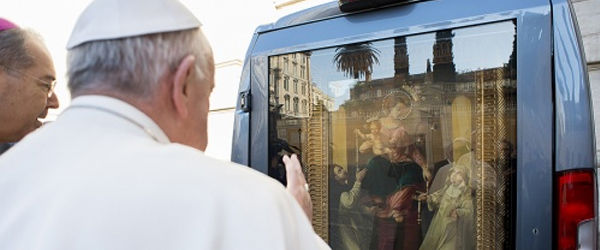With a ruling that acknowledged the final decision will be up to the Supreme Court, a federal appeals court declared the Defense of Marriage Act unconstitutional May 31.The 1st U.S. Circuit Court of Appeals overturned the provision of the 1996 federal law, known as DOMA, that defines marriage as "a legal union between one man and one woman as husband and wife."
The U.S. Conference of Catholic Bishops and the Massachusetts Catholic Conference, which had urged the court to uphold the law, jointly issued a press release June 1 calling the ruling disappointing.
"The federal appeals court in Boston did a grave injustice yesterday by striking down that part of the Defense of Marriage Act that reasonably recognizes the reality that marriage is the union of one man and one woman," said the statement from Bishop Salvatore Cordileone of Oakland, chairman of the bishops' Subcommittee for the Promotion and Defense of Marriage. "DOMA is part of our nation's long-established body of law rooted in the true meaning of marriage."
The president of the National Organization for Marriage, which opposes same-sex marriage, accused the judges of inventing the legal path to the ruling.
"Liberal federal judges in Massachusetts and California have resorted to making up legal standards in order to justify redefining marriage," said a statement from Brian Brown. "They realize the legal precedent doesn't allow them to redefine marriage, so they are making up new standards to justify imposing their values on the rest of the nation."
Judge Michael Boudin, who wrote the opinion, was appointed to the 1st Circuit by President George H. W. Bush. The other two judges who joined the opinion were Judge Sandra Lynch (appointed by President Bill Clinton) and Judge Juan Torruella (appointed by President Ronald Reagan).
The panel cited previous Supreme Court rulings that struck down laws determined to be discriminatory against a class of people as being among the keys to their ruling. They also stayed their ruling pending review by the Supreme Court.
The case was brought against the federal government by a group of same-sex married couples and several widowed spouses, all from Massachusetts. They seek access to federal benefits such as Social Security that would be available to heterosexual married couples but are blocked under DOMA.
The law was passed soon after Hawaii's Supreme Court held that it might violate the state constitution to deny marriage to same-sex couples. Amid concern that states would soon begin to allow same-sex marriages, Congress passed and President Bill Clinton signed the 230-word law, which the appeals court described as "one of the shortest major enactments in recent history."
Since then, 30 states have passed constitutional prohibitions on same-sex marriage while six states and the District of Columbia have passed laws permitting it. Another dozen states, including Hawaii, have laws recognizing civil unions between people of the same sex.
The 1st Circuit was reviewing only the provision of DOMA that defines "marriage" and "spouse," not its provision guaranteeing that no state or territory is required to recognize a marriage recognized by another state or territory.
The court said the case was difficult, "because it couples issues of equal protection and federalism with the need to assess the rationale for a congressional statute."
That rationale is "open to interpretation," the judges said, adding: "We have done our best to discern the direction of these precedents, but only the Supreme Court can finally decide this unique case."
In summarizing some of its conclusions, the court noted: "Many Americans believe that marriage is the union of a man and a woman, and most Americans live in states where that is the law today.
"One virtue of federalism is that it permits this diversity of governance based on local choice, but this applies as well to the states that have chosen to legalize same-sex marriage. Under current Supreme Court authority, Congress' denial of federal benefits to same-sex couples lawfully married in Massachusetts has not been adequately supported by any permissible federal interest."
The ruling noted that under DOMA, federal funding to Massachusetts could be revoked for programs tied to the law's definition of marriage, such as Medicare and Medicaid or burial in a veterans' cemetery as a spouse.
"By combining the income of individuals in same-sex marriages, Massachusetts' Medicaid program is noncompliant with DOMA, and the Department of Health and Human Services, through its Centers for Medicare and Medicaid Services, has discretion to rescind Medicaid funding to noncomplying states," the judges said. "Burying a veteran with his or her same-sex spouse removes federal ‘veterans' cemetery’; status and gives the Department of Veterans' Affairs discretion to recapture all federal funding for the cemetery."
In his statement, Bishop Cordileone also said marriage of a man and a woman "is the cornerstone of society," and a "foundation of a just society, as it protects the most vulnerable segment of the population, children."
"Every child longs for and deserves a mother and a father, and marriage is the only institution that ensures that children grow up knowing and being known by their mother and father," he said. "The public good demands that this truth of marriage be respected in law and society, not rejected."
---CNS

